Overview
- Description
- Contains approximately 47 pieces of correspondence addressed to Oded Yarkoni, a soldier in the Jewish Brigade, sent to him primarily in 1945 and 1946 from locations throughout Europe (Tournai, Rotterdam, Goteborg). The collection also contains a few letters from wartime and pre-war Poland.
- Date
-
inclusive:
1936 September 04-1946 October 18
- Credit Line
- United States Holocaust Memorial Museum Collection, The Abraham and Ruth Goldfarb Family Acquisition Fund
- Collection Creator
- Oded Yarkoni
Physical Details
Rights & Restrictions
- Conditions on Access
- There are no known restrictions on access to this material.
- Conditions on Use
- Material(s) in this collection may be protected by copyright and/or related rights. You do not require further permission from the Museum to use this material. The user is solely responsible for making a determination as to if and how the material may be used.
Keywords & Subjects
- Corporate Name
- Great Britain. Army. Jewish Brigade
Administrative Notes
- Holder of Originals
-
United States Holocaust Memorial Museum
- Legal Status
- Permanent Collection
- Provenance
- Acquired, March 2012.
- Funding Note
- The acquisition of this collection was made possible by The Abraham and Ruth Goldfarb Family Acquisition Fund.
- Record last modified:
- 2024-07-11 07:32:54
- This page:
- https://collections.ushmm.org/search/catalog/irn46964
Download & Licensing
In-Person Research
- Available for Research
- Plan a Research Visit
-
Request in Shapell Center Reading Room
Bowie, MD
Contact Us
Also in Jewish experience ephemera and manuscript collection
The collection consists of a booklet, correspondence, documents, fliers, and memoirs relating to the cultural life, emigration, and history of the Jewish people in Europe and Palestine during and after the Holocaust.
Date: approximately 1940-1948
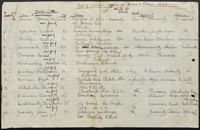
List of candidates for immigration, Palestine (Eretz Israel)
Document
Collection of 26 pages of lists of candidates for immigration to Palestine, varied provenance, both handwritten and typewritten, arranged by name of sponsor in Palestine, with information about candidates including names, countries of origin, addresses, age, and gender. Included are letters addressed to the Aliyah Department, Jewish Agency.
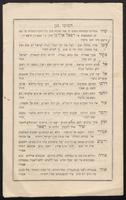
A song of blessing for the Day of Independence
Document
One leaf, four printed pages, containing the printed text of a song in Hebrew, in honor of the day of Israel's independence, 1948. The song was rhymed by Refa'el Edre'ii, and printed in Morocco. The leaflet contains two additional liturgical songs and poems.
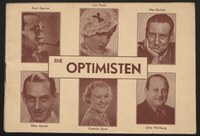
Die Optimisten
Document
Booklet containing information about planned variety and theatrical perfomances of "Die Optimisten," a group of German Jewish emigre actors and performers in Amsterdam, April 1940-July 1940. The performers belonged to an organization called "Amsterdamer Gesellschaft der Freunde."
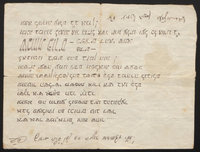
Purim note, Wadowice, Poland, February 1945
Document
One handwritten note, written in a bunker by inhabitants of the Wadowice Ghetto, February 1945. Contains linguistic riddles, Purim greetings, and expresses the hope that the war will end soon.
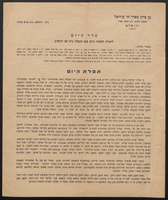
Rabbi Ben-Zion Meir Hai Uziel prayer leaves
Document
Two prayer leaves, issued on behalf of Rabbi Ben-Zion Meir Hai Uziel, calling upon people to observe a public fast and day of prayer, April 1942. Issued under the auspices of the Chief Eretz Israel rabbinate and the Society of American and Canadian Rabbis.
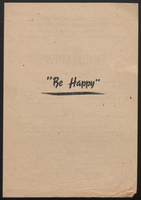
Zajt Frajlich = Be Happy
Document
Program for a theatrical production of the Idischer Dramatischer Krajz (Jewish Dramatic Group) at the displaced persons camp, Landsberg/Lech, undated, circa late 1940s.
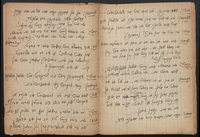
Notebook from American Joint Distribution Committee in Italy, containing handwritten text of Sholem Aleichem play
Document
One notebook, 31 leaves, produced by the American Joint Distribution Committee in Italy, undated. One cover contains a map of Israel with the name of the committee in Hebrew, the other cover contains a map of Italy with the name of the committee in English. The handwritten contents consist of act 2 of the play "Shver tsu zayn a Yid," by Sholem Aleichem. An ink stamp on the verso of the front cover states, in Hebrew, that this belonged to the "Estate of Michael Greenstein, director and actor of the Yiddish theatre, 1915-2004, and Dr. Miriam Greenstein, 1916-2000."
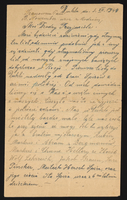
November-Brandeis family papers
Document
Correspondence, identification documents, immigration forms, and related documentation concerning the family of Mendel and Lea Brandel (Bronka) November, their exile in the Soviet Union during World War II, their correspondence with Mrs. November’s family in Poland during the German occupation, and their subsequent return to Poland after the war and immigration to Israel. The bulk of the correspondence and documents relate to the experiences of Mendel November and his wife, Lea Brandel (Bronka). The documents in this collection are arranged according to type and origin. One series of correspondence consists of postcards and letters that the family received from Bronka’s mother Adela, often with greetings from Hinda Findling and Regina Brandeis as well, all of whom remained in Dukla, after the German occupation of that region. Correspondence from the Brandeis family stopped in mid 1941, although Bronka’s brother Aron (Abraham?) sent several postcards written in Russian, from Berlin and Lublin in 1945, toward the end of World War II. A separate set of correspondence contains letters sent to and from Henry Hirschberg, of Bridgeport, Connecticut, who was related to the Brandeis family through marriage. Hirschberg, in a notarized statement of 1946, attested that “my wife Rachel G. Hirschberg née Findling” was “the late mother of” of Lea Brandel November (née Brandeis) and Abraham Brandeis, and that she was a sister of “Mrs. Ides Brandeis, née Findling,” presumably Adela Brandeis. Correspondence from the Hirschberg family (Henry, wife Gisela, son Julius Harris) includes cards seeking to establish contact—apparently unsuccessfully--with Adela Brandeis and her family in Poland after the war. Correspondence from other friends and family members is filed separately from the Hirschberg and Brandeis correspondence. The latter group of documents pertain to the Novembers’ experiences in the Soviet Union during the war, their return to Poland in 1946, and their attempts to emigrate after that. Included are letters attesting to Mendel November’s employment with various firms in the Soviet Union, documents pertaining to the search for any living Brandeis family members in Poland, and documents from the family’s early years in Israel during the 1950s.
Von Prag nach Mauritius
Document
One typescript memoir, with five unattributed woodcuts, documenting the author's experiences as a would-be emigrant from Czechoslovakia to Palestine in 1940. The ship he was traveling on, the Atlantic, was seized by British authorities and the author and other passengers were interned on the island of Mauritius until 1945. The memoir, written in 1941-1942, documents this experience. Also included is a separate, handmade booklet containing seven pen-and-ink drawings of shipboard life and internment, by Fritz Haendel and another unidentified artist.
Parole der Woche propaganda card exposing Jewish advisors controlling FDR
Object
Miniature German propaganda poster issued during the week of September 30 to October 6, 1942, from the Parole der Woche (Word of the Week) series. The poster claims that United States President Franklin Roosevelt set up a committee of advisors dubbed “the Brain Trust,” comprised of Jews and Jewish sympathizers. The poster then shows photos of Roosevelt’s supposed advisory committee: Bernard M. Baruch, Henry Morgenthau, Felix Frankfurt, Sol Bloom, Fiorello La Guardia, Cordell Hull, and claims that they are the real rulers in the U.S. In reality, Roosevelt’s “Brain Trust” was established in 1932, during his presidential campaign. The group’s key members were Raymond Moley, Rexford Tugwell, and Adolph Berle. Other advisors worked with the group as needed. The men on the poster were all high-ranking state or federal officials, but were not necessarily a part of the “Brain Trust,” and had varying degrees of influence over U.S. policy. Their presence on this poster is a reflection of their ties to Judaism being misused to fit the Nazi narrative of the “Jewish Enemy.” The Nazis used propaganda to buttress public support for the war effort, shape public opinion, and reinforce antisemitic ideas. As part of their propaganda campaign, the Nazis created the Word of the Week Series of posters (also referred to as Wandzeitung, or wall newspapers), which began distribution on March 16, 1936. Each week, new posters were placed in public places and businesses to be viewed by as many people as possible. Posters were the primary medium for the series, but smaller pamphlets were also produced, which could be plastered on the back of correspondences. The posters targeted the Nazis’ early political adversaries, Jews, Communists, and Germany’s enemies during the war. The series was discontinued in 1943.
Announcement and political proclamation issued postwar by a Jewish cultural group in Munich
Object
One sided handbill issued by a Jewish cultural group in Munich, Germany, March 1951, concerning the future of Yiddish journalism in Germany.



